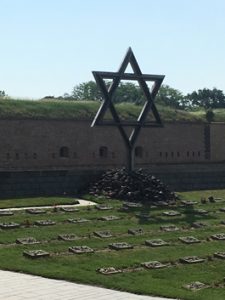Treasures from the Music Collection of the Astor Judaica Library will present the second program in its Music from the Holocaust series, Music from Terezin, on Thursday, May 11, 2 p.m. in the library. This free series is co-sponsored by “We Are The Tree of Life.”
Register here: https://my.lfjcc.org/12927/12929
The Czech fortress town of Terezin (or Theresienstadt) was established by the Nazis as a transit station for Jews. By October, 1941, its local population of 6000 was evacuated. The following month, the first transport of Jewish artists, musicians, theater people, intellectuals, authors and scientists began to arrive. They came from Czechoslovakia, Germany, Austria, Hungary, Holland and Denmark.
By September, 1942, over 58,000 inmates were crowded into this ghetto. In spite of the dire conditions—0ver 33,000 died in Terezin of maltreatment, disease, exhaustion and starvation–Terezin had a flourishing cultural life, including the composing and performing of music. The Nazis even made a propaganda movie about this Paradise Ghetto, using newly arrived, still healthy-looking people to illustrate their point and including excerpts from the children’s opera, Brundibar.
Sandra Scheller will be the special guest for this program, which I will be hosting. Sandra’s mother, Ruth, and her cousin Dita were interned in Terezin.

Dita even sang in Brundibar. Sandra is the curator of The RUTH Holocaust Exhibit, which will be opening at the Rancho San Diego Library on Sunday, May 21, 11 a.m.-1 p.m.
Music From Terezin will include recordings of works by composers Robert Dauber, Pavel Haas, Gideon Klein, and Hans Krasa.
Robert Dauber was born in Vienna in 1922. His father was a famous Jewish violinist, Dol Dauber, from Bukovina. His mother was a Bohemian German from Brno. The whole family moved to Prague in 1936. Robert was sent to Terezin in August 1942. He participated in the musical life there, performing the cello part in the opera Brundibar. He was transported to Dachau in September 1944, where he died the following year. Serenata for violin and piano is his only preserved composition.
Pavel Haas was born into a prominent Jewish family in the Moravian capital of Brno. This was a city with a rich cultural life, and it was during Haas’ childhood that Leoš Janáček established himself as a leading figure, both regionally and nationally. Haas became an important composer of theater and film music. The war years limited Haas’ professional development, and in 1941 he was sent to Terezín. At first, he was too ill and depressed to compose. But with the encouragement of Gideon Klein, Haas became part of the rich musical life of the camp, writing several works, including his last, a song cycle based on Chinese Poetry. He was deported to Auschwitz in October 1944 and immediately killed.
Gideon Klein was one of the most talented musicians in Terezin. He was an outstanding pianist and composer. Born in Moravia in 1919, he moved to Prague, where he studied piano and composition before being sent to Terezin. There, he not only gave recitals and composed music, he organized concerts and taught the orphaned children. He was deported in 1945 and murdered in Furstengrube, a sub-camp of Auschwitz.
Hans Krasa was born in Prague in 1899. From an early age, he showed extraordinary musical talent. After completing his liberal arts studies, he attended the German Music Academy. Before graduating, he was hired as vocal coach at the New German Theater in Prague. He later studied orchestral composition at the Berlin Conservatory, then went to Paris for further study. He returned to Prague where, in 1933, he received a Czechoslovak State Prize for Composition for his opera, Betrothal in a Dream. His last work before his internment in Terezin in April 1942 was Brundibar, the children’s opera. Brundibar was performed in Terezin 55 times before Krasa was sent to Auschwitz in October 1944, where he was killed in the gas chamber.
We can only guess what contributions these talented composers might have made to the world of music had their lives not been so cruelly cut short.


























